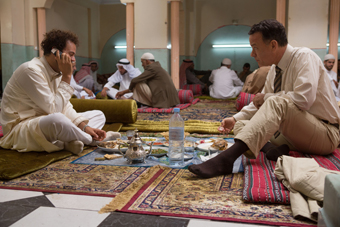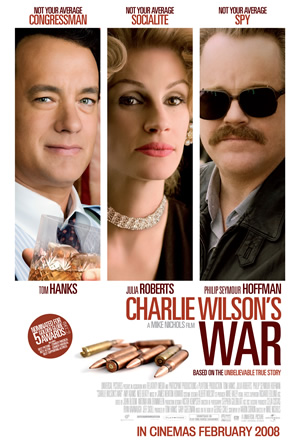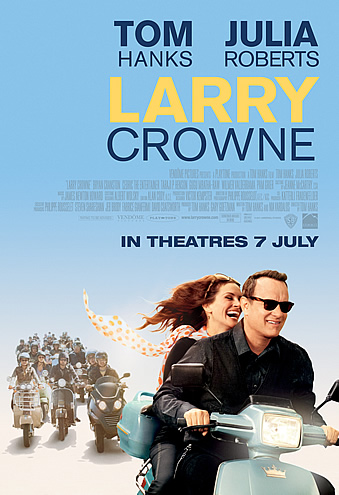A HOLOGRAM FOR THE KING (2016)
Genre: Comedy/Drama
Director: Tom Tykwer
Cast: Tom Hanks, Sarita Choudhury, Tom Skerritt, Alexander Black, Ben Whishaw
Runtime: 1 hr 38 mins
Rating: M18 (Sexual Scene)
Released By: Shaw
Official Website: http://www.ahologramforthekingfilm.com
Opening Day: 2 June 2016
Synopsis: He lost his job, his wife left him and he cannot pay his daughter’s tuition fees. Alan Clay (54) sets his hopes in the “King Abdullah Economic City”, a shiny, modern metropolis in the Arabian desert. He tries to sell an American IT company’s teleconferencing system to the king. But when Alan arrives for the deal, the king lost his interest in the project, and does not show up. Alan befriends Yousef, a young driver, with whom he gets to know the country and all the contradictions between modern and traditional spirits. On a hospital visit Alan meets Zahra. He ignores Yousef‘s warning, not to get involved with her. In the end, the project does not concern Alan anymore. He is not disappointed, that it failed, because he found happiness. With Zahra, a new professional calling and a new home.
Movie Review:
Few Hollywood actors can claim to be as inherently watchable – or for that matter, inherently likeable – as Tom Hanks, and it is for this reason alone that Tom Tykwer’s shambling and often scattershot adaptation of the 2012 critically acclaimed Dave Eggers novel is engaging. Trading his source material’s elegiac tale for an absurdist farce built on familiar but clichéd culture clashes, Tykwer relies on Hanks to be the movie’s intellectual and emotional centre of gravity as the latter embarks on a career- and possibly life-saving business trip to the Kingdom of Saudi Arabia (referred to as ‘KSA’) to pitch a holographic IT system to the elusive king.
It may not bear the name Alan Clay, but Hanks has certainly played the role of the middle-aged man facing his own obsolescence – one good example in point being ‘Larry Crowne’, yet another one of the actor’s Playtone-produced stories of uplifting redemption. A surreal opening scene set to the Talking Heads’ ‘Once in a Lifetime’ sees Hanks walk down a suburban street as images of his “large automobile”, “beautiful house”, and "beautiful wife" disappear in plumes of purple smoke, whose character is broke and reeling from a particularly nasty divorce. In sharp, cutting flashbacks, we further learn of his sad state –unable to pay for his daughter’s college tuition, berated by his father (Tom Skeritt) for outsourcing American jobs to China during his tenure at the Schwinn Bicycle Company, and suffering from occasional anxiety attacks.
A lot is riding on this business pitch, but Clay meets a series of defeating hurdles as soon as he arrives in the Middle East. He misses his shuttle on the first day. By the time he reaches, the king is nowhere to be found, and no one knows just when he will return. His three IT assistants are sequestered in an outdoor tent where the WiFi is patchy and the air-conditioning is unreliable. Worse still, the tent is just steps away from a sleek air-conditioned office building, which he marches up repeatedly to and is stonewalled by a female receptionist who tells him that his “primary contact” will see him the next day and the next. Ennui sets in, defined by repetitive sequences of him greeting the hotel concierge, emptying piles of sand from his shoes and stepping into the shower for a bath.
Though it does make a couple of asides about China’s impact on American businesses both in the States as well as abroad, Tykwer seems really more keen on being an affable fish-out-of-water tale about American provincialism in a globalized world, played out in Clay’s interactions with the locals he encounters – including a good-natured English-speaking driver Hakeem (Dhaffer L'Abidine) who loves Chicago, Elvis Presley and reggae, a randy Danish consultant Hanne (Sidse Babett Knudsen) who offers him booze in an olive oil bottle, and a female Saudi doctor Zahra (Sarita Choudhury) whom he sees about the growth on his back and whom he eventually develops a romantic connection with.
These encounters prove illuminating not so much because of their effect on Clay but rather as interesting case studies of how individuals adapt to and defy custom under the strict laws and rules of the KSA. Hakeem, for instance, is ga-ga over a married woman he texts and talks on the phone from time to time, in spite of the risks that he knows upon his life as well as that of the woman. Hanne’s invitation to Clay to attend a dinner party at the Danish embassy becomes an eye-opener about how Westerners let loose in the country. And most significantly, Clay’s attraction for Zahra becomes a heartening observation of two mature adults who decide to defy society’s conventions not with abandon but with measure and reason as they embrace the stirrings of their own hearts.
But it is also precisely because there is so much going on that Tykwer struggles to do justice to the major themes that arose naturally from Eggers’ prose, primarily the latter’s meditation on globalization and the concomitant demise of the American dream. Indeed, these feel lost – and to use the title’s own metaphor, hollow – amidst a busy serio-comic fable that mixes intimate woes with dark geopolitical undercurrents. And yet, like we said at the start, If what amounts to little actually seems otherwise watching it, that is all credit to Hanks, who despite stepping into yet another familiar middle-aged man role, does it with warmth, empathy, and a wry understated charm.
Movie Rating:



(Tom Hanks' genial Everyman charm, combined with a down-to-earth warmth and empathy, makes this otherwise shambling and scattershot adaptation of Dave Eggers' novel intermittently engaging and enjoyable)
Review by Gabriel Chong
You might also like:

Movie Stills









